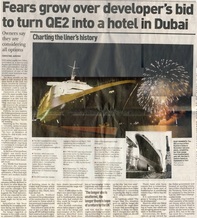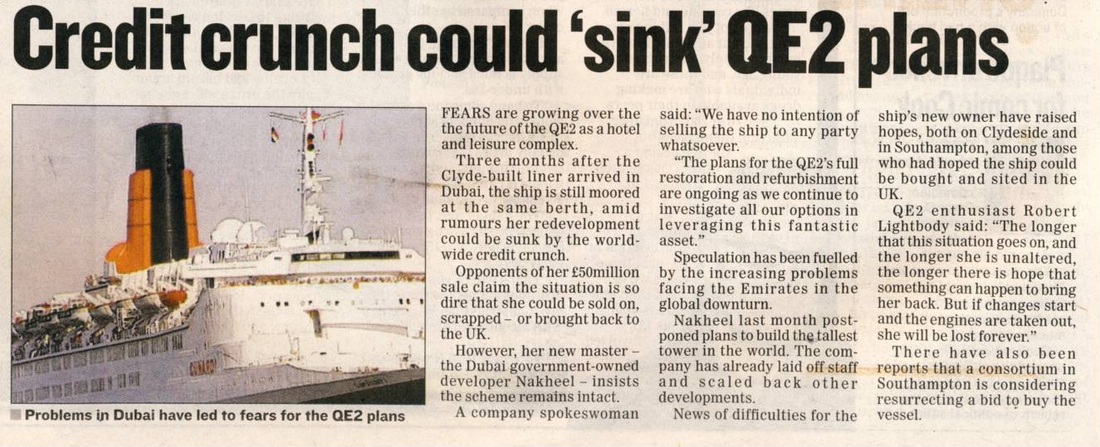Home > Ocean Liners > Queen Elizabeth 2 > QE2 News > QE2 Dubai News > Fears grow over developer's bid to turn QE2 into a hotel in Dubai
Fears grow over developer's bid to turn QE2 into a hotel in Dubai
The Herald, 16th February 2009
Christine Jardine
She sailed regally into Dubai, welcomed by a spectacular flypast and fireworks display, with a proclamation that she was about to become the centrepiece of one of the world's most luxurious tourist destinations.
Yet three months on, the QE2 is still moored at the same berth in the Gulf, her future clouded by internet-fuelled rumours that her redevelopment could be sunk by the worldwide credit crunch.
Opponents of her £50m sale to the super-wealthy Arab emirate have claimed the situation is so dire that she could be sold on or scrapped. They maintain that could even resurrect the prospect of the Clyde-built liner being brought back to the UK.
Publicly, her new masters, the Dubai government-owned developer Nakheel, insists the scheme remains intact, yesterday issuing a "hands off" warning. Speaking to The Herald, a company spokeswoman emphatically rejected the speculation and stressed: "We have no intention of selling the ship to any party whatsoever." She added: "The plans for the QE2's full restoration and refurbishment are ongoing as we continue to investigate all our options in leveraging this fantastic asset."
At the time of her purchase, Nakheel was much more bullish in giving details of the development as part of the ultra-luxurious Palm Jumeirah resort. At a Middle East Seatrade Conference, the company revealed plans included new, bigger luxury hotel rooms, apartments, a West End-style theatre and modern health spa.
Yesterday, however, the company politely declined to be drawn on what shape the ship's redevelopment might take and the admission that it is "investigating" options suggests the final outcome, which was expected to take two to three years to complete, might not be cut and dried.
Speculation has been fuelled by the increasing problems facing the Emirates in the current global downturn. No longer regarded as immune to the credit crunch, an estimated £500bn worth of building plans in the United Arab Emirates, which includes Dubai and oil-rich neighbour Abu Dhabi, have been shelved. Last month, Nakheel announced the postponement of the construction of a 1km-tall tower in Dubai which it had previously boasted would be the world's highest. That followed news at the end of last year that it was laying off 500 staff and scaling back construction of its signature man-made islands which have drawn international celebrities and the mega-rich as residents.
News of difficulties for the ship's new owner have raised hopes, both on Clydeside and in Southampton, among those who had wished the ship could be bought and sited in the UK.
One Scottish enthusiast, whose father played a significant role in the design and maintenance of the QE2's turbines, described some aspects of the latest situation as "encouraging". Robert Lightbody said contacts who had been on board recently told him that the ship's engines were being kept working and that they did not see refurbishments taking place on the ship "any time soon". There have also been unconfirmed indications from Dubai that Nakheel is considering reopening the ship to visitors "as is", using its existing power plant.
Mr Lightbody added: "The longer that this situation goes on, and the longer she is unaltered, the longer there is hope that something can happen to bring her back. But if changes start and the engines are taken out, she will be lost forever."
There have also been reports that a consortium in the ship's home port of Southampton is considering resurrecting a bid to buy the vessel. It is understood that the group is "keeping a close eye on developments".
However, while one Dubai developer may have a problem at home, two others are still ploughing ahead to capitalise on Scottish assets.
Leisurecorps, the development group owned by the Dubai government and focused on sporting events, has a £30m refurbishment of the Turnberry Hotel due to be completed in time for it to host the 2009 Open Championship in July.
Meanwhile, Guy Crawford, chief executive of the Jumeirah Group, which owns the iconic Burj al Arab Hotel in Dubai and plans to open a £125m six-star hotel in Glasgow in 2011, was in the city last week for a hospitality awards conference.
Christine Jardine
She sailed regally into Dubai, welcomed by a spectacular flypast and fireworks display, with a proclamation that she was about to become the centrepiece of one of the world's most luxurious tourist destinations.
Yet three months on, the QE2 is still moored at the same berth in the Gulf, her future clouded by internet-fuelled rumours that her redevelopment could be sunk by the worldwide credit crunch.
Opponents of her £50m sale to the super-wealthy Arab emirate have claimed the situation is so dire that she could be sold on or scrapped. They maintain that could even resurrect the prospect of the Clyde-built liner being brought back to the UK.
Publicly, her new masters, the Dubai government-owned developer Nakheel, insists the scheme remains intact, yesterday issuing a "hands off" warning. Speaking to The Herald, a company spokeswoman emphatically rejected the speculation and stressed: "We have no intention of selling the ship to any party whatsoever." She added: "The plans for the QE2's full restoration and refurbishment are ongoing as we continue to investigate all our options in leveraging this fantastic asset."
At the time of her purchase, Nakheel was much more bullish in giving details of the development as part of the ultra-luxurious Palm Jumeirah resort. At a Middle East Seatrade Conference, the company revealed plans included new, bigger luxury hotel rooms, apartments, a West End-style theatre and modern health spa.
Yesterday, however, the company politely declined to be drawn on what shape the ship's redevelopment might take and the admission that it is "investigating" options suggests the final outcome, which was expected to take two to three years to complete, might not be cut and dried.
Speculation has been fuelled by the increasing problems facing the Emirates in the current global downturn. No longer regarded as immune to the credit crunch, an estimated £500bn worth of building plans in the United Arab Emirates, which includes Dubai and oil-rich neighbour Abu Dhabi, have been shelved. Last month, Nakheel announced the postponement of the construction of a 1km-tall tower in Dubai which it had previously boasted would be the world's highest. That followed news at the end of last year that it was laying off 500 staff and scaling back construction of its signature man-made islands which have drawn international celebrities and the mega-rich as residents.
News of difficulties for the ship's new owner have raised hopes, both on Clydeside and in Southampton, among those who had wished the ship could be bought and sited in the UK.
One Scottish enthusiast, whose father played a significant role in the design and maintenance of the QE2's turbines, described some aspects of the latest situation as "encouraging". Robert Lightbody said contacts who had been on board recently told him that the ship's engines were being kept working and that they did not see refurbishments taking place on the ship "any time soon". There have also been unconfirmed indications from Dubai that Nakheel is considering reopening the ship to visitors "as is", using its existing power plant.
Mr Lightbody added: "The longer that this situation goes on, and the longer she is unaltered, the longer there is hope that something can happen to bring her back. But if changes start and the engines are taken out, she will be lost forever."
There have also been reports that a consortium in the ship's home port of Southampton is considering resurrecting a bid to buy the vessel. It is understood that the group is "keeping a close eye on developments".
However, while one Dubai developer may have a problem at home, two others are still ploughing ahead to capitalise on Scottish assets.
Leisurecorps, the development group owned by the Dubai government and focused on sporting events, has a £30m refurbishment of the Turnberry Hotel due to be completed in time for it to host the 2009 Open Championship in July.
Meanwhile, Guy Crawford, chief executive of the Jumeirah Group, which owns the iconic Burj al Arab Hotel in Dubai and plans to open a £125m six-star hotel in Glasgow in 2011, was in the city last week for a hospitality awards conference.

